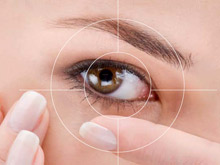Health Topics
-
Healthy Living
-
|
|
March 2010
|
| Understanding Glaucoma |
| Dr Shikha Fogla |
| |
 |
Glaucoma is a term applied to a group of eye diseases that cause a characteristic and recognisable deterioration of the optic nerve. There are many forms and causes of glaucoma - some known, some yet to be discovered - and each person’s glaucomatous condition is unique. The optic nerve carries visual information between the eye and the brain, much like the cable between a computer screen and the computer. |
In the brain, this information is assembled into a visual image that we recognise as sight. When the optic nerve is damaged or injured, the transmission of visual information is altered and, hence, the visual image is impaired. Since patients with glaucoma may be unaware of any change in their vision until late in the course of the disease, they may not seek medical attention until there is substantial permanent damage. Fortunately for patients who do have regular examinations, ophthalmologists can usually detect glaucomatous optic nerve damage before there is noticeable visual loss by examining the back of the eye. Sometimes, damage to the nerve can be observed even before specialised tests detect a change of vision.
Causes
At the front of the eye, there is a small space called the anterior chamber. Clear fluid flows in and out of the chamber to bathe and nourish nearby tissues. Glaucoma causes impaired fluid outflow from the eye (increased fluid production is rare). This leads to increased pressure in the eyes. Unless this Intraocular Pressure (IOP) is controlled, it may cause damage to the optic nerve and other parts of the eye and loss of vision. Increasing age, a family history of glaucoma, blunt eye trauma (like say, a cricket ball hitting the eye, making it swollen) etc are some of the risk factors for glaucoma. This could eventually develop into myopia (objects at a distance appearing blurred) or hypermetropia (difficulty focussing on near objects) too.
Symptoms
In most individuals, glaucoma does not cause any symptoms, and vision stays normal. However, as the disease progresses, a person with glaucoma may notice his or her side vision gradually failing. Objects in front may still be seen clearly, but objects to the side may be missed. As the disease worsens, the field of vision narrows and ultimately, blindness results.
Diagnosis
The best way to prevent vision loss from glaucoma is early diagnosis and treatment. See your eye doctor every year, if you are above 40 years, for a complete examination, including an IOP check. People at high risk for glaucoma due to high IOP, family history, ethnic background, age or optic nerve appearance may need more frequent visits to the eye doctor. A test called a visual field may be performed on glaucoma suspects to detect peripheral vision loss. It involves staring straight ahead into a machine and clicking a button when you notice a blinking light in your peripheral vision. The visual field test may be repeated at regular intervals for your doctor to determine the extent of vision loss.
Treatment
Glaucoma treatment (for any form) entails decreasing aqueous humor production, increasing fluid drainage or a combination of the two. These treatments will not be able to restore any vision already lost due to glaucoma.
3 Treatment Methods
Medications: These may be either in the form of eye drops or pills. Some drugs are designed to reduce pressure by slowing the flow of fluid into the eye. Others help to improve fluid drainage. For most people with glaucoma, regular use of medications will control the increased fluid pressure. But, these drugs may stop working over time. Or, they may cause side effects. If a problem occurs, the eye doctor may select other drugs, change the dose, or suggest other ways to deal with the problem.
Laser surgery: One form of glaucoma needs laser treatment called laser iridotomy. During laser surgery, a laser beam of light is focused on the part of the anterior chamber where the fluid leaves the eye. This results in a series of small changes, which makes it easier for fluid to exit the eye. Over time, the effect of laser surgery may wear off. Patients who have this form of surgery may need to keep taking glaucoma drugs.
Surgery: Surgery can also help fluid escape from the eye and thereby reduce the pressure. However, surgery is usually reserved for patients whose pressure cannot be controlled with eye drops, pills, or laser surgery. |
 |
Dr. Shikha Fogla is Consultant Ophthalmologist & Glaucoma Specialist at Apollo Health City, Hyderabad |
|
|